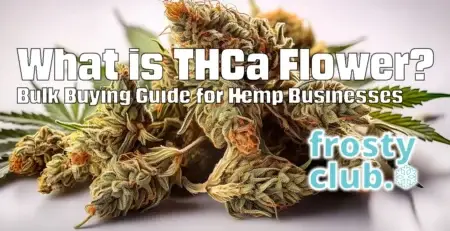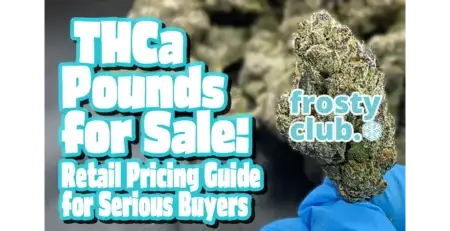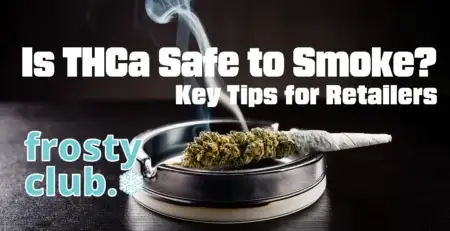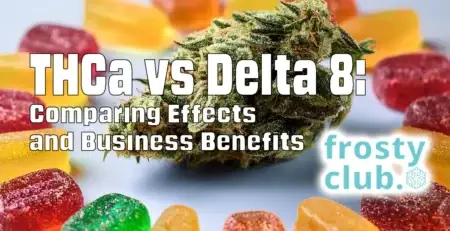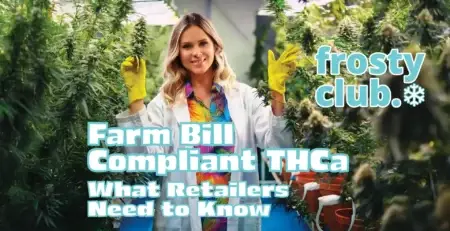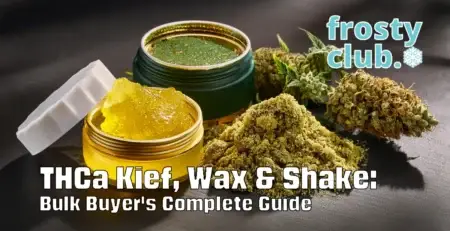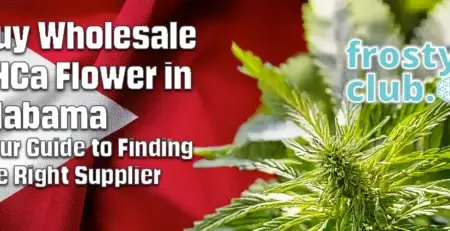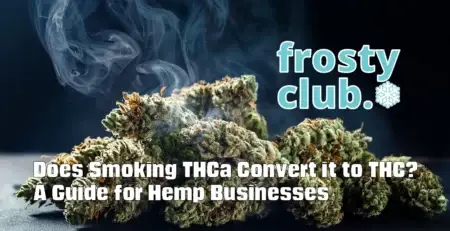To start, does THCa get you high? It’s a question asked by curious consumers and hemp businesses alike. Understanding tetrahydrocannabinolic acid (THCa) and its effects is critical for retailers, distributors, and anyone navigating the hemp industry. While often associated with THC, THCa has unique qualities that impact its legal status, usability, and market appeal for hemp products.
This post will unravel the science behind THCa, clarify how it differs from THC, explore the legal landscape, and spotlight premium THCa hemp flower products from Frosty Club. Whether you’re looking to expand your inventory or educate your customers, this guide will provide valuable insights.
What Is THCa?
First, a reminder about the popular compound.THCa, or tetrahydrocannabinolic acid, is a naturally occurring cannabinoid found in raw cannabis and hemp plants. Often referred to as the “precursor” to THC, it plays a key role in the plant’s chemical makeup. Unlike THC, which is well-known for its psychoactive effects, THCa is non-psychoactive in its raw form.
The scientific difference lies in their chemical structures. THCa has an extra carboxyl group in its molecular structure. This carboxyl group prevents THCa from binding to the CB1 receptors in the brain, which are responsible for the intoxicating effects associated with THC.
The transformation of THCa into THC occurs through a process called decarboxylation. Smoking, vaping, or cooking exposes THCa to heat, causing it to lose the extra carboxyl group and become psychoactive THC. Without this heat activation, THCa remains non-intoxicating, making it an attractive option for hemp businesses working within the legal framework of the 2018 Farm Bill.
Does THCa Get You High?
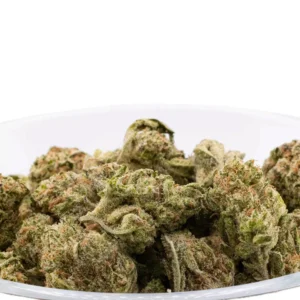
Short answer? No, not unless it’s heated.
THCa, by itself, does not produce a high. Its chemical structure prevents it from interacting with the brain in a way that causes psychoactive effects. However, heating THCa, for example by smoking or vaping, causes decarboxylation, converting it into THC, which possesses strong psychoactive properties.
This dual functionality makes THCa intriguing for different markets. On the one hand, consumers seeking health benefits without intoxication can use raw THCa products like tinctures or capsules. Conversely, those seeking a high can legally smoke or vape THCa hemp flower in states with limited legal cannabis access.
Understanding this process is crucial for hemp businesses. The key selling point of THCa products often resides in their versatility, as they can cater to both non-intoxicating and intoxicating use cases, depending on how they’re consumed.
THC vs. THCa: What’s the Difference?

Deciphering the differences between THC and THCa is essential for both consumers and businesses to understand their unique properties and uses fully. Although they appear closely linked, their processing and consumption methods significantly affect their effects and applications.
Chemical Structure and Interaction
THCa and THC differ chemically in the presence of a carboxyl group. THCa, in its raw form, doesn’t bind to CB1 receptors, hence its non-psychoactive nature. THC, on the other hand, binds directly, leading to intoxication.
Psychoactive Effects
The most significant difference is their impact on consumers. THC produces euphoria, relaxation, and sometimes paranoia. THCa, however, provides no high but may offer potential therapeutic benefits under ongoing research, such as anti-inflammatory and neuroprotective properties.
Drug Testing
Another key distinction is drug testing—most standard drug tests screen for THC metabolites. Since THCa and THC are chemically different, THCa in its raw form rarely triggers a positive test result. However, once converted to THC via heat, it could show up in test results. Hemp businesses should educate customers on proper handling and consumption methods to avoid misunderstandings.
Understanding THCa Is Key to Business Success
For hemp businesses, understanding the nuances of THCa answers the critical question: Does THCa get you high? While THCa in its raw form does not produce a high, it can convert to THC when heated, offering dynamic consumer appeal. By stocking premium THCa hemp flowers like those from Frosty Club, businesses can cater to diverse customer needs while staying compliant with federal laws.
To ensure your business leads in the hemp industry, partner with Frosty Club to access high-quality, legally compliant THCa products. Contact us today and take the next step in confidently growing your business.



